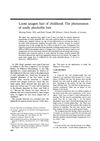95 citations,
July 2015 in “European journal of pharmaceutics and biopharmaceutics” Lipid nanoparticles can help deliver drugs through hair follicles but struggle to penetrate deeper skin layers.
87 citations,
September 2016 in “Journal of the American Academy of Dermatology” Intralesional triamcinolone effectively reduces pain and inflammation in hidradenitis suppurativa flares.
 85 citations,
February 1989 in “Journal of The American Academy of Dermatology”
85 citations,
February 1989 in “Journal of The American Academy of Dermatology” Children with loose anagen hair have easily pluckable hair due to root sheath problems, and it might improve without treatment.
76 citations,
October 2000 in “Journal of the American Academy of Dermatology” Follicular mucinosis can be an early sign of aggressive mycosis fungoides.
 62 citations,
January 2000 in “Developmental dynamics”
62 citations,
January 2000 in “Developmental dynamics” Notch-related genes play a key role in the development and cycling of hair follicles.
 41 citations,
June 2018 in “Journal of The American Academy of Dermatology”
41 citations,
June 2018 in “Journal of The American Academy of Dermatology” Some treatments for folliculitis decalvans work well, with tetracyclines and a mix of rifampicin and clindamycin being most effective.
 33 citations,
November 2006 in “Survey of Ophthalmology”
33 citations,
November 2006 in “Survey of Ophthalmology” Madarosis is the loss of eyelashes and eyebrows due to various health issues and requires thorough examination to diagnose and treat the underlying cause.
 33 citations,
February 1996 in “Journal of The American Academy of Dermatology”
33 citations,
February 1996 in “Journal of The American Academy of Dermatology” Treat scalp and beard fungal infections early with oral antifungal medication and sometimes topical therapy, avoiding unnecessary allergy tests and surgery.
28 citations,
May 1998 in “Journal of the American Academy of Dermatology” Scalp inflammation can cause multiple hairs to grow from one follicle.
 22 citations,
January 2013 in “Journal of The American Academy of Dermatology”
22 citations,
January 2013 in “Journal of The American Academy of Dermatology” Birth control pills can help manage acne, but dermatologists should know their skin-related side effects, especially when prescribing drugs that can harm unborn babies.
18 citations,
July 2010 in “Journal of the American Academy of Dermatology” Folliculotropic mycosis fungoides can look like alopecia areata.
 17 citations,
February 2018 in “British Journal of Oral & Maxillofacial Surgery”
17 citations,
February 2018 in “British Journal of Oral & Maxillofacial Surgery” Forehead reduction and orbital contouring are important for satisfactory facial feminization in transgender females, with high satisfaction and low long-term problems.
16 citations,
August 1996 in “The journal of experimental zoology/Journal of experimental zoology” Red deer hair cells offer a new way to study how hormones affect hair growth.
 15 citations,
February 1999 in “The anatomical record”
15 citations,
February 1999 in “The anatomical record” Some mutant mice have hair with abnormal cross-linking, mainly in the cuticle, not affecting other hair parts.
 13 citations,
August 1980 in “Cancer”
13 citations,
August 1980 in “Cancer” Multimodal primary treatment improves survival in premenopausal breast cancer patients and is also beneficial for postmenopausal women.
 10 citations,
October 2002 in “Journal of The American Academy of Dermatology”
10 citations,
October 2002 in “Journal of The American Academy of Dermatology” The document concludes that a man's long hair may have helped diagnose his rare case of chronic hair shedding, for which no treatment is advised.
7 citations,
March 2022 in “Journal of the American Academy of Dermatology” Stress can trigger or worsen alopecia areata.
7 citations,
November 2021 in “JAAD Case Reports” Mogamulizumab can cause hair loss and skin rashes.
 6 citations,
April 2018 in “Obstetrics, gynaecology and reproductive medicine”
6 citations,
April 2018 in “Obstetrics, gynaecology and reproductive medicine” Most women with hirsutism have it because of PCOS, and they need long-term treatment including medication and hair removal to improve their condition.
5 citations,
May 2020 in “Journal of the American Academy of Dermatology” AGA might indicate higher risk for severe COVID-19.
 5 citations,
March 2014 in “Journal of The American Academy of Dermatology”
5 citations,
March 2014 in “Journal of The American Academy of Dermatology” The study suggests hormonal factors may play a role in Frontal Fibrosing Alopecia and that treatments like oral antiandrogens and steroids could be beneficial.
 4 citations,
May 2011 in “Journal of The American Academy of Dermatology”
4 citations,
May 2011 in “Journal of The American Academy of Dermatology” Certain hairstyles increase the risk of scalp and hair disorders in African American girls.
 3 citations,
May 2014 in “Journal of The American Academy of Dermatology”
3 citations,
May 2014 in “Journal of The American Academy of Dermatology” Dermatologists greatly affect inpatient diagnosis and treatment of skin conditions, especially in spotting infections in patients with weakened immune systems.
3 citations,
August 2013 in “Journal of the American Academy of Dermatology” A new method quickly detects hair changes from EGFR inhibitors using a microscope.
3 citations,
February 1983 in “Journal of Investigative Dermatology” Hair plucking quickly increases antizyme, reducing a specific enzyme activity in rats.
2 citations,
September 2021 in “Anais Brasileiros de Dermatologia” Increased sunscreen use may be linked to frontal fibrosing alopecia in Hispanic females.
1 citations,
January 2021 in “Elsevier eBooks” Olive and olive oil help prevent and manage heart diseases.
1 citations,
January 1998 in “International journal of cancer” Rubbing vitamin D3 on skin can help prevent hair loss from chemotherapy and slow breast tumor growth in mice.
 1 citations,
January 1987 in “Journal of The American Academy of Dermatology”
1 citations,
January 1987 in “Journal of The American Academy of Dermatology” The patient's hair loss was likely not caused by beta blockers but possibly by stress or other factors.
November 2024 in “Journal of the American Academy of Dermatology”














